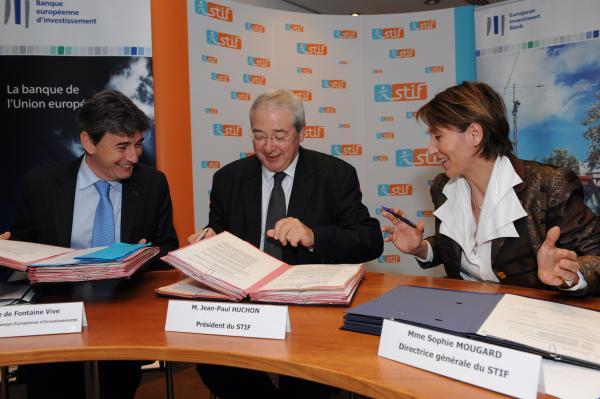
Philippe de Fontaine Vive Curtaz, Vice-President of the European Investment Bank (EIB), Jean-Paul Huchon, President of the Île-de-France Region and Chairman of STIF, and Sophie Mougard, Managing Director of STIF, signed today in Paris a finance contract amounting to EUR 600m to renew and upgrade the rolling stock currently in use on the Île-de-France network.
This is the first borrowing operation by STIF, Île-de-France’s transport authority, to finance its investments.
This project is intended to provide the Île-de-France Region with modern, attractive and efficient rolling stock that will meet the transport requirements of its inhabitants on a sustainable basis. This is a major programme with an estimated total cost of more than EUR 2bn, financed 50/50 by STIF and SNCF.
The EIB’s loan, totalling EUR 600m, will specifically enable STIF to:
- purchase 172 Franciliens (NAT electric trains) and 24 AGC (Autorails grande capacité) trains;
- and upgrade double-decker trains on RER suburban lines C and D (Z2N).
This project will help to increase the rail network’s capacity while at the same time considerably enhancing reliability, speed and passenger comfort. By offering a quality service, the region’s population will be more inclined to use public transport, thereby reducing the environmental impact of urban transport and helping to combat climate change.
Mr Philippe de Fontaine Vive, EIB Vice-President, hailed the signature of this loan: “I welcome this maiden operation between the EIB and STIF to upgrade the Region’s railway lines. It demonstrates the EU’s support for sustainable urban transport. The promotion of rail transport is a priority for Europe and a key factor in the Île-de-France Region’s economic, social and human development as it satisfies a genuine need to enhance the daily quality of life of millions of people. The EIB is a long-term financial partner of the Île-de-France Region and this operation is the first of a partnership that is set to expand in the future.”
This loan ties in with the EIB’s ongoing priority action in France, historically via the development of high-speed lines connecting Paris with London, Brussels, Luxembourg, Strasbourg, Geneva, Marseille, etc. and increasingly at regional level. In 2009, over EUR 1bn was earmarked by the EIB for the upgrading of public transport, including urban transport projects financed in the cities of Lyon, Bordeaux and Paris (extension of the T3 tramway line in the east of the capital between Porte d’Ivry and Porte de la Chapelle). In 2010, the EIB financed the Dijon and Brest tramways.
Jean-Paul Huchon, President of the Île-de-France Region and Chairman of STIF, pointed out that “in 2006 when the local authorities, led by the Region, took control of public transport in Île-de-France, we inherited 30 years of underinvestment in both infrastructure and trains themselves. One of the first measures that STIF decided then was to upgrade the trains used on its network, with one goal: that by 2016, all trains in Île-de-France would either be new or refurbished in the previous 10 years. And they will be!”
Documentation:
Press file and photos of the Francilien train: www.lepremierfrancilien.com
Note to editors:
About the EIB and its support for urban transport
The EIB sees its lending in favour of exclusive-lane public transport as part of its action to promote sustainable urban development, with the emphasis on reducing pollution and improving the quality of life in urban areas. It has provided funding for numerous urban transport projects, notably in Bordeaux, Clermont-Ferrand, Grenoble, Le Mans, Lyon, Marseille, Montpellier, Mulhouse, Nancy, Nantes, Nice, Orleans, Paris, Reims, Strasbourg, Toulon, Toulouse and Valenciennes. Over the last decade, EIB lending for urban transport has totalled EUR 4bn in France and EUR 23.7bn in the EU, including projects financed in Athens, Alicante, Barcelona, Bilbao, Brussels, Berlin, Valencia, Lisbon, London, Madrid, Munich, Düsseldorf, Manchester, Dublin, Budapest and Prague.
The EIB is the bank of the European Union. Its task is mainly to provide long-term loans for viable public or private sector investment projects that foster the EU’s integration, cohesion and development in line with six priority policies: economic and social cohesion; protection of the natural and urban environments; research and innovation; support for SMEs; expansion of the trans-European transport networks and promotion of a secure, competitive and sustainable energy supply. In 2009, it granted loans worth EUR 70bn in the European Union – a 36% increase on the EUR 51.7bn lent in 2008. Likewise in 2009, to boost the economy in the midst of the crisis, it granted loans totalling EUR 79bn to local authorities and enterprises within and outside the Union.
About STIF, Île-de-France’s public transport authority
STIF devises, plans, organises, coordinates and finances all public transport in Île-de-France. It entrusts implementation to the constructors and transport operators.
Serving the public and the general interest is key to STIF, whose remit is to enhance public transport and facilitate travel for the population of Île-de-France. STIF is permanently in contact with the passengers, notably via consultation and public debate.
STIF, which represents local authorities (Île-de-France Region, Municipality of Paris and seven other departments in the Region), is the transport authority of Île-de-France.
STIF is the key sustainable mobility player in Île-de-France, at the heart of urban and regional dynamics. Adapting transport to new lifestyles and integrating the issue of sustainable development are permanent goals.
Press contact:
STIF: www.stif.info

